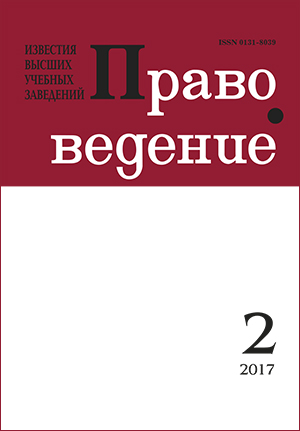Politics and law in the philosophical-elitological doctrine of Heraclitus of Ephesus
Abstract
The political and legal doctrine of Heraclitus of Ephesus occupies a special place in the philosophical tradition of the Antiquity. Being the founder of the dialectics, he gave the ancient philosophy a powerful tool for investigating the phenomena of micro and macro cosmos. The present work analyses the political and legal views of the philosopher as a public thinker. At the same time, special attention is paid to the issue of social and cultural selectivity revealed through such categories as quality, the better, consistency, superiority, perfection, hierarchy, and aristocracy. The author’s emphasis is on elitological features of the concept under consideration, on the establishment of its ethical and epistemological norms, as well as the influence that it exerted on the development of the subsequent philosophical and legal thought. The concept of “Logos” (lex) is the main political and legal category of Heraclitus. It was introduced for the first time as a universal explanation of both ontology of the Cosmos and the epistemology of the social being. According to the philosopher, the power quality directly depends on the quality of the education it receives. Therefore, he is extremely skeptical about those democratic norms (procedures) of elections that do not take into account or openly ignore the principle of education. The opinions expressed by him have not lost their relevance nowadays, thus demonstrating that he had discovered certain fundamental principles of the political and legal scientific thought. Heraclitus continues to examine the issue of the correlation between the mass and the elite raised by Pythagoras, giving a clear preference to the latter. As a main distinguishing factor, he uses a qualitative criterion. The theme of relationships between the elite and the masses is the common thread of his social teachings. The person of the elite differs from the person of the masses, above all, by the quality of his/her knowledge. It is this qualitative superiority that makes him/her a professional, at the same time determining the quality of his/her power. Separate provisions of the philosopher are still relevant today and can be transferred to modern practice.
Keywords:
politics, law, lex, elite, aristocracy, philosophy, dialectics, Logos, good, ethics, wisdom, justice
Downloads
References
Downloads
Published
How to Cite
Issue
Section
License
Articles of "Pravovedenie" are open access distributed under the terms of the License Agreement with Saint Petersburg State University, which permits to the authors unrestricted distribution and self-archiving free of charge.




